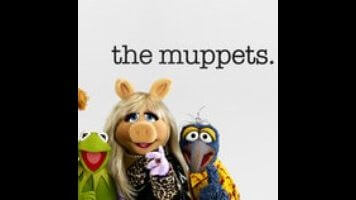So here’s the good news about The Muppets, Kermit The Frog and company’s return to television after a nearly two-decade absence from primetime: Despite all the pre-air hoopla about an “adult” Muppet show, the first two episodes of the series are mercifully short on “adult” Muppet jokes. There’s some mature language—a “hell” here, a “suck” there—and the occasional innuendo, but the stars of Bill Prady and Bob Kushell’s Muppet Show update don’t go full Meet The Feebles. A plotline about Miss Piggy dating Josh Groban gets a little personal, but it doesn’t get sexual. Unless you’re predisposed to picturing puppets bedding one another, Prady and Kushell aren’t going to show it to you.
The bad news about The Muppets is that the show doesn’t hit the ground running—which is understandable for characters whose legs are so rarely visible. In format and logotype, the show mimics The Office, but the NBC sitcom of recent vintage it most readily resembles is 30 Rock. Particularly those early installments dominated by the day-to-day business of running TGS With Tracy Jordan, when the relationships weren’t solidified and the jokes-per-minute ratio was more sluggish. The Muppets shouldn’t have to do that much relationship work (it did a lot of that heavy lifting this summer, to mixed results), but The Muppets have definitely been faster, furrier, and more furious with their joke-telling in other venues. A better version of the show peeks out whenever the plot relents and the characters are allowed to let fly with a knowingly groan-worthy play on words, a throwaway non sequitur, or any other hallmark of the Jim Henson school of humor. A vaudevillian gag about the band Imagine Dragons scores one of the biggest laughs of the first two episodes, as does a visual gag that takes the phrase “Throw everything at Keanu Reeves” literally.
The new show represents a first for The Muppets, serving here as the staff of the fictional late-night talk show Up Late With Miss Piggy: They’ve never been at the center of a sitcom before. The characteristics that drove the backstage storylines on The Muppet Show are pushed to their limits when they’re powering a full 22 minutes of TV—with no reprieve from Veterinarian’s Hospital, Muppet News Flash, or Bobby Benson’s Baby Band. For characters with Miss Piggy- or Fozzie Bear-sized personalities, the transition is easy to weather; the writers show no strain in generating material from Piggy’s massive ego or Fozzie’s tangle of insecurities. Sending Fozzie to a party at Jay Leno’s house sets up some superb Muppets-in-the-human-world mischief, and the bear’s idolization of Leno goes a long way to explaining his comedic mediocrity.
As the eternal eye in the storm of Muppet madness, Kermit The Frog proves a tougher nut for The Muppets to crack. The show needs to demonstrate that he’s authoritative but flappable, recovering from his breakup with Piggy yet broken up over the end of their relationship. But the show overcompensates on those counts, rendering one of the friendliest and sincerest figures in the pop culture canon into something of a manipulative prick. It’s a pitfall of the mockumentary format, a “real” version of the frog that even the cuddliest aspects of Steve Whitmire’s performance struggle to overcome. In front of the documentary cameras, Kermit is cruel to Piggy, insulting to his guests, and weirdly smug about a matchmaking ploy that foists his ex on the equally smug Josh Groban (nearly sinking Up Late in the process). At least this version of Kermit manages to introduce conflict into the world of The Muppets, which is more than can be said for most sitcom protagonists these days. (But further points against Kermit for bringing his rebound girlfriend, the upsettingly inexpressive pig puppet Denise, into the proceedings.)
But it’s still magical to watch these characters navigate the real world—as dispiriting as it may be to see them reflect it. The second generation of Muppet performers is making their mark while honoring the previous generation, and it’s great to see Muppet Show veterans like Dr. Teeth And The Electric Mayhem, The Swedish Chef, and Uncle Deadly taking part in Up Late With Miss Piggy. (Casting foppish gargoyle Uncle Deadly as Piggy’s wardrobe chief is an inspired choice.) If only the fruits of their labor were more readily visible: The Muppets is a workplace comedy at heart, but the glimpses of Up Late With Miss Piggy pull off the reality-versus-“reality” jokes better than any talking-head interview. They’re also the best venue for the show’s celebrity cameos, with the exception of run-in between Kermit and Laurence Fishburne that’s straight out of the El Sleezo Café.
And every once in a while, The Muppets shows what a truly “adult” Muppet Show could be. It’s not a bunch of puppets making sex jokes or innocent characters caught up in the ugly world of showbiz, nor is it the “sophistication” Piggy feigns at in a Groban-ized version of Up Late that requires The Electric Mayhem to play unplugged. Flashing back to the moment of Piggy and Kermit’s breakup, The Muppets stumbles upon the soulfulness of these characters, the capacity for emotion that makes them TV’s funniest tellers of terrible jokes and its most joyful singers of sad songs. Running The Muppets through the mockumentary house of mirrors doesn’t make them more believable or relatable—making us feel something for them does.
Reviews by Dan Caffrey will run weekly

 Keep scrolling for more great stories.
Keep scrolling for more great stories.
